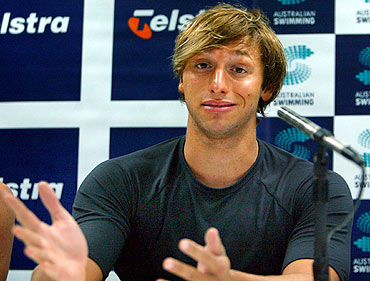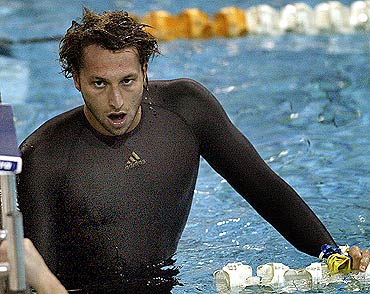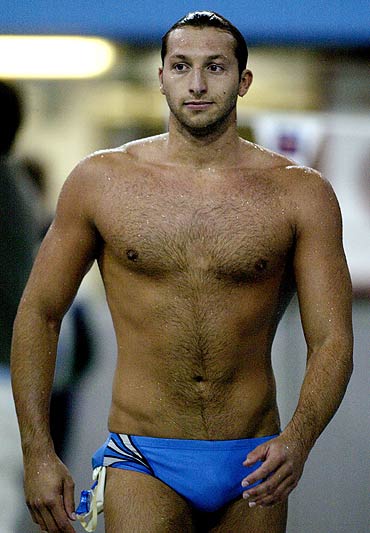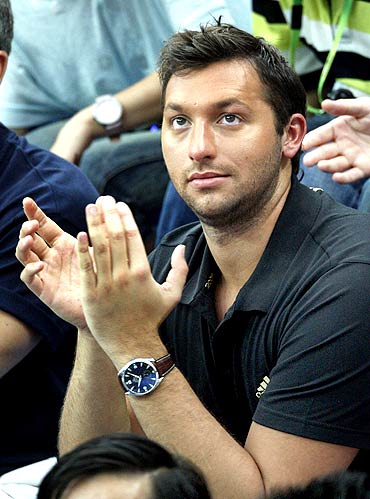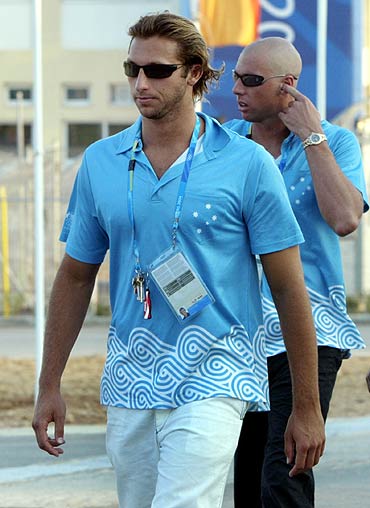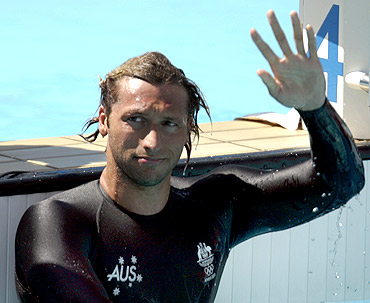 | « Back to article | Print this article |
Ian Thorpe's return makes up for premature exit
Ian Thorpe's decision to return to competitive swimming has added an intriguing new twist to next year's London Olympics and sets the stage for possibly one of the most anticipated races of all time.
The Australian is already assured of his place as one of swimming's greats after winning five Olympic gold medals but his decision to retire in 2006, at the age of 24, was a bittersweet and premature ending to a spectacular career that made him a household name.
Thorpe became the youngest male world champion when he won his first world championship in 1998 at just 15 but his life was never the same and he struggled to cope with living as though he was in a goldfish bowl.
Photographs: Reuters
Thorpe spent six years demolishing world records
He spent the next six years demolishing world records and stockpiling an unprecedented collection of gold medals, that included five Olympic and 11 world titles, but it came at a high price.
Aided by flipper-sized feet and hands like saucers, Thorpe possessed a perfect technique that made swimming look easy and nothing seemed beyond him.
However, he was constantly wrestling his own demons, trapped between his sporting ambitions and his hopes for a normal life away from the constant grind of training and the relentless glare of attention.
After scooping six gold medals at the 2001 world championships in Japan, Thorpe faced increasing pressure to try to better Mark Spitz's record haul of seven Olympic titles from the 1972 Munich Games.
A brush with death convinced him his pursuit was futile
While his best performances were in 200 metres and 400m freestyle, Thorpe took the bait and began to experiment with new distances and strokes in the hope of finding a seventh event for the 2004 Athens Olympics.
But everything changed on Sept. 11, 2001 when a brush with death convinced him his relentless pursuit of Olympic immortality was futile and there were more important things in life.
Thorpe was on holiday in New York and was on his way to the World Trade Center when the first hijacked plane struck the twin towers.
The harrowing experience made him reassess his priorities and he vowed not to waste another day, abandoning his quest to replicate Spitz and splitting with long-time coach Doug Frost to train under Tracey Menzies, his former high school art teacher, who encouraged him to explore life outside the pool.
Thorpe took her advice, travelling the world to mix with the rich and famous and indulging in his passion for fashion, but his motivation for swimming started to wane.
Thorpe took a year off to recharge his batteries
He stopped breaking world records and almost missed the chance to defend his Olympic 400m title when he slipped off the blocks and was disqualified for a false start during the Australian trials.
He was reinstated when his friend and team mate Craig Stevens gave up his place to Thorpe and duly went on to win the gold in Athens.
Thorpe won a second gold in Greece when he beat Michael Phelps in the 200m final billed as the "race of the century" but the pressure had taken its toll.
He took a year off to recharge his batteries ahead of the 2008 Beijing Olympics but never made it back, announcing in 2006 that he had lost of interest in swimming and wanted to pursue a new life.
His competitive juices finally got the better of him
Speculation about a possible comeback started almost as soon as he retired but for the first four years Thorpe showed no inclination to take the plunge, even after losing his 200m and 400m world records and seeing Phelps win an unprecedented eight gold medals in Beijing.
But his competitive juices finally got the better of him late last year when he visited the Olympic pool in London and decided on a comeback, albeit diluted with some restrictions.
With less than 18 months to go before the start of the London Olympics, Thorpe said he did not have enough time to train for the 400m, a gruelling event, so would focus instead on the 100m and 200m.
'I haven't felt this way about swimming for a long time'
He said he hoped only to qualify for the 4x100m and 4x200m relays but did not rule out making individual events, raising the mouthwatering prospect of another possible showdown with Phelps.
"I haven't felt this way about swimming for a long time," he explained at the announcement of his comeback.
"In the time out from the pool I have been able to get on with what I wanted, which is a more normal life ... but there has been something nagging."
Meanwhile, the coach of Michael Phelps has welcomed Ian Thorpe's announcement that he will return to competitive swimming, saying he looks forward to seeing him at the 2012 London Olympics for what could be the ultimate race.
Although Phelps is unrivalled as the greatest Olympic swimmer of all time, winning a staggering 14 gold medals, Thorpe famously beat both the American and Pieter van den Hoogenband to win the 200 metres freestyle at the 2004 Athens Olympics in a final perhaps prematurely dubbed the "race of the century."
Phelps might get a chance to face Thorpe now
With Thorpe announcing that he plans to make a comeback for the London Olympics, Phelps could finally get his chance to go head to head with Thorpe again.
And adding even more spice to a race that would undoubtedly be one of the most eagerly-anticipated events in London, is the addition of Germany's Paul Biedermann, the reigning 200m world champion and world record holder.
"I welcome Ian back to the sport," Phelps' coach, Bob Bowman, told Reuters after Thorpe's announcement.
"His presence will only increase the interest and enthusiasm for swimming and we look forward to seeing him back on deck soon.
"He is one of the true greats and it will be fun to have him back in the mix for London."

© Copyright 2025 Reuters Limited. All rights reserved. Republication or redistribution of Reuters content, including by framing or similar means, is expressly prohibited without the prior written consent of Reuters. Reuters shall not be liable for any errors or delays in the content, or for any actions taken in reliance thereon.
